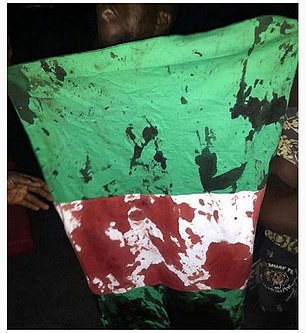#EndSARS: Buhari’s Legacy of Failed “Assurances’’
By: Rinu Oduala
The Buhari Years: What We Ordered vs What We Got – civil society leaders reflect on the Buhari Administration and its achievements, shortcomings, and regressive actions.
This article focuses on reforming the police.
——–
The start of Buhari’s tenure as President of Nigeria represented a defining moment for the country. The hope was that his campaign promises of reform and accountability would translate into cleansing Nigeria’s law enforcement agencies of the deeply rooted issues that perpetuate human rights violations. However, as his eight-year administration comes to an end, the failure to address police brutality and enact meaningful reforms, as evidenced by the #EndSARS protests, stands out as a powerful testament to his larger failure in governance.
The #EndSARS protests that rocked Nigeria in 2020 were a culmination of years of frustration with police misconduct and a call for justice. The protests began in 2016 when activists used social media to call out the abuses of the notorious Special Anti-Robbery Squad (SARS) of the Nigeria Police Force. Despite multiple so-called ‘disbandments’ of SARS, the unit continued to operate with impunity, highlighting a lack of political will to tackle the issue head-on and a lack of commitment to genuine change.

Reports of extrajudicial killings, sexual assaults, torture, extortions, and harassment by SARS and other law enforcement agencies never prompted the administration to take urgent action, neither did earning the ‘Worst Police Force in the World’ title in 2016. The only energetic action seen was the repeated “assurances” of investigation, and prosecution of offending officers.
In 2018, the National Human Rights Commission (NHRC) constituted a Presidential Panel that received reports of human rights violations, including murder, forced disappearances, torture, and illegal detentions. However, almost four years later, the report is yet to see the light of day, let alone achieve justice for those who filed complaints. Civil society organisations reported no fewer than 122 documented cases of extra-judicial killings within nine months and 105 human rights violations complaints in 90% of the cases, where the Nigeria Police Force was accused of being the violator – in 2020 alone. From 2011 to 2021, no less than 10,000 Nigerians were reported killed by security agencies in Nigeria, according to a report by the Centre for Democracy & Development (CDD). Had President Buhari ensured the implementation of the 2018 report findings, the events of October 2020 may never have happened.
The peaceful protests shook the foundations of Nigeria’s socio-political landscape, sparked by yet another case of police brutality, reminding Nigerians of the epidemic that the police force had become. Nigerians from all walks of life united in a demand for justice, accountability, and an end to the police impunity that had terrorised the nation for years.
Few days into the protests, the police killed another young Nigerian in Oyo State, and began to shoot at protesters in various parts of Nigeria. In response to police brutality protests, Nigerians were met with more police brutality. Reports indicate that at least 48 persons suffered various forms of rights violations, including death during the protests. Additionally, the Chief Pathologist of Lagos State teaching hospital revealed that the state morgue received 99 dead bodies during the time of the protests and atrocious massacre at the Lekki Tollgate.
The government then escalated its repression by freezing the bank accounts of protesters, placing them on no-flight lists and arresting numerous others. Many “#EndSARS suspects” remain in prison, till date, on trumped-up charges, kept as scapegoats, because they dared to protest. Security forces have continued to deploy tear gas and live bullets against peaceful protesters in all subsequent protests.
The disbandment of the SARS was a step in the right direction but lacked the substantive reforms necessary to bring about lasting change. The promised investigation and prosecution of officers involved in misconduct fell short, and police reforms were marred by inefficiency, lack of transparency, and a failure to hold those responsible for human rights abuses accountable. Despite signing the Police Bill in 2020, the government flouts it, and disobeys court orders, infringing on human rights and emboldening the police to further trample on them.
The administration misled Nigerians in 2022, claiming to have implemented all the demands presented by #EndSARS protesters, but made little tangible progress towards implementing substantial changes.
Despite “assurances” from President Muhammadu Buhari that police reforms would be implemented, the government’s subsequent actions revealed a stark contrast between rhetoric and reality. Instead of addressing the root causes of police brutality, the government responded with repression, intimidation, and violence against peaceful protesters. This not only violated citizens’ rights to free expression and assembly but also highlighted a systemic failure to uphold the principles of democracy and protect the very people the government should serve, revealing a lack of empathy and deepening distrust between the government and its citizens.
The lack of robust accountability mechanisms, effective vetting processes, and comprehensive training programs has continued to have devastating consequences for Nigerians, perpetuating a cycle of violence, injustice, and impunity and leaving the nation grappling with the consequences of unaddressed systemic problems.
Reports indicate that the culture of enforced disappearances, sexual abuse, human rights abuses and torture continues by law enforcement agencies, and the government’s failure to implement the recommendations of panels investigating police brutality has only worsened the situation. Police stations have been attacked by terrorists and separatists, police officers continue to live in deplorable conditions, and incidents of citizen-police reprisals have further undermined public safety.
Despite the “disbandment of SARS”, police officers continue to roam the streets, behaving in a similar manner: extorting, harassing, and extrajudicially executing Nigerians. Officers who were previously recommended for prosecution have been exonerated by the state. Each passing day, Nigerians lose their lives due to the police’s excessive use of force; from refusal to give a bribe to accidental discharge – pregnant women and children are not left out. Trust in the government’s ability to protect its citizens has eroded, and the government’s consistent use of public resources to encourage police brutality and repression, further erodes this trust.
By dismissing the valid calls for social justice, Buhari also missed an opportunity to bridge the gap between the government and citizens, demonstrating a disconnection from the realities faced by the citizens he was elected to serve. The consequences of retorting to the youths’ demand with half-hearted investigations, evasive tactics, and empty rhetoric reverberate through our society, hindering the progress of meaningful reform.
The failures of the outgoing administration in Nigeria cannot be overlooked, as the wounds inflicted by abusive security agencies continues, and the subsequent disappointment in the government’s response continues to fester. The hopes and expectations of Nigerians for an end to police brutality cannot be in vain. Police reforms are an urgent necessity for Nigeria, and not just an abstract notion. They are a matter of life and death for the younger generation.
The next leadership must prioritise police reforms and overhauls, not just as a response to public pressure, but as a genuine commitment to protecting the rights and dignity of every citizen. Urgent and concrete steps must be taken to form strong oversight mechanisms to prevent further cases of police impunity, harassment, and state-sanctioned violence and to establish a police force that is professional, accountable, and respectful of human rights.
The #EndSARS protests were not merely a moment in time; they were a resounding call for justice, accountability, and reform. It is time for Nigeria to take decisive steps towards building a nation where peace and justice reign. Without justice, progress becomes unattainable.
 Rinu Oduala is the project director of Connect Hub NG, a human rights organisation focused on documenting, defending and advocating against police brutality and state violence in Nigeria. She was one of the leaders of the 2020 #EndSARS protests.
Rinu Oduala is the project director of Connect Hub NG, a human rights organisation focused on documenting, defending and advocating against police brutality and state violence in Nigeria. She was one of the leaders of the 2020 #EndSARS protests.
